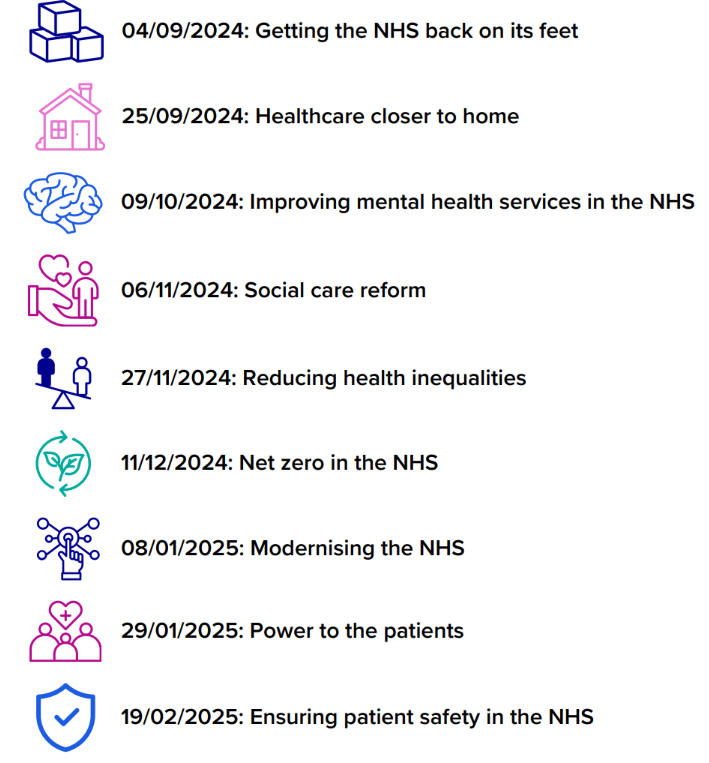If you would like more information, or to hold a feasibility discussion, please use this link to book a 1:1 meeting or reach out to enquiries@unityinsights.co.uk and a member of the team will be in touch.
Click here if you are happy to hear about our work, upcoming webinars and events via email.
The incoming Labour government pledges to ‘build an NHS fit for the future’ through lowering patient waiting times, modernising the NHS, and improving patient safety. NHS leaders have welcomed the ‘mission-based’ approach, and are seeking to engage with the new cabinet team to support delivery.
Local commissioning teams will likely face challenges due to the proposed expansion of the NHS workforce, facilitation of system and pathway modernisation, and engagement with industry and independent sector partners. Prioritising and delivering change, while remaining informed regarding future advancements will be a significant consideration over the course of this government. This briefing document provides an overview of our previous experiences regarding such matters to facilitate development of effective strategies, support with prioritisation and decision-making, and flag potential risks that may require mitigation structures.
This document will explore the following new government priorities:
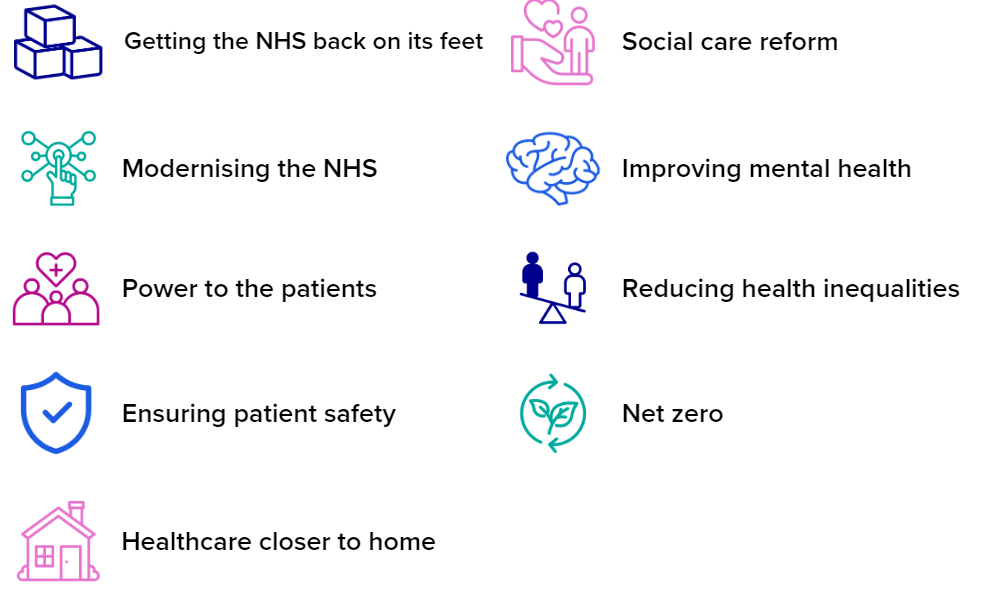

Capacity
Building capacity in the system will be a medium to long term goal of the new government to improve access, but in the short-term maximising the usage of available capacity is paramount. Unity Insights have specialised in assessing efficiency with health economic modelling, system dynamics modelling, and use of simulation to understand the interactions between demand and capacity.
Unity Insights were able to advise on the implementation of particular delivery models within NHS Sussex Integrated Care Board (ICB) using simulation and health economic analysis. This allowed the ICB to ensure effective use of limited resources available during winter pressures.
Workforce
Recruitment and retention of clinical staff are key priorities for the new government, enabling more appointments for patients in need and better quality care. For example, the government is considering plans to expand the role of pharmacists to prescribe, and further changes to the workforce and their interoperability are likely. Through our work, we can assess the impact and sustainability of workforce changes, including factors affecting recruitment and retention. For instance, we collaborated with Health Innovation Kent Surrey Sussex to deliver an exploratory impact analysis that articulated the potential effects on the workforce of several solutions such as Sleepio, Electronic Repeat Dispensing (eRD), and S12 Solutions. The evaluation identified key metrics and measurement strategies that were disseminated across the South of England, while highlighting the potential benefits of such solutions that can release pressure upon staff and improve services from a patient perspective. The team have also examined larger-scale strategic matters related to the workforce, such as creating a roadmap to understand the implementation of AI in the NHS and its impact on the workforce for Health Education England.
Learn more about our work on efficiency here.
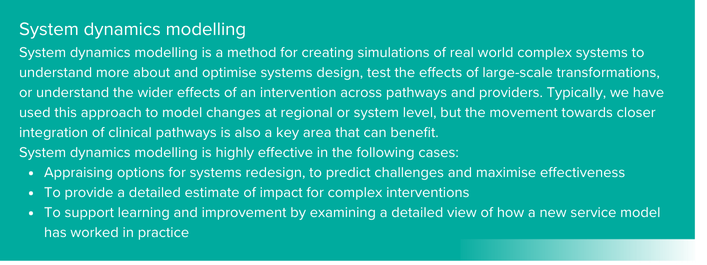
Modernising the NHS
The new government is prioritising cutting-edge digital and diagnostics technology, data science, and becoming a world leader for trialling new interventions.

The role of data and the innovation and adoption strategy
We have been at the forefront of conversations on the future of data science and analytics in the NHS, with inputs into the recent Goldacre Review. Previously, Unity Insights was part of Health Innovation Kent Surrey Sussex and has worked closely with the 15 Health Innovation Networks across England since. We provide expert support to commissioners to monitor and evidence the impact of large-scale programmes, as well as providing quality improvement support to programme managers.

Digital technology
Benefits of digital technologies can be difficult to quantify. We are experts in evaluating digital technologies, such as communication and information applications, and are well-versed in linking metrics to impacts realised by patients, staff, and the wider system. This provides key NHS decision-makers with the reassurance that they are creating informed, reliable choices surrounding digital technologies.

Earlier diagnosis, including AI
The Labour government proposes to provide earlier diagnosis to reduce avoidable disease mortality and upgrade diagnostic equipment, while increasing access to diagnostic services. Unity Insights has evaluated how diagnostic tools, such as AI-powered DERM and Cytosponge, improved patient outcomes and relieved system pressures. Similar evaluations have also taken place where the focus was on the development of effective pathways, such as the telescopic referral pathway, rather than the tools themselves. Given our vast experience in evaluating AI, Unity Insights was commissioned to develop a guidebook and learnings from 13 AI technology evaluations of the Phase 4 AI Awards in Health and Care funded by the Department of Health and Social Care.
Learn more about our work on digital technology here.
Power to the patients
One of the core priorities of the new government’s manifesto is the intention to keep the patient and their families ‘at the heart of every medical decision’, keeping the people most affected by these decisions fully informed and able to effectively navigate the system.
Respect and listening
Central to the delivery of this promise is the provision of receptive clinical services that can relate to the patient’s perspective and provide appropriate support. Unity Insights have recently helped evaluating the transformation of community mental health services in Surrey, a project that put a major emphasis on co-production and incorporating people with lived experience to inform the transformation and to play an active role in service delivery. We have also supported quantitative analysis to support a Q community project seeking to work with third sector organisations to increase the number of people with learning disabilities implementing reasonable adjustments within primary care.

Informed patient decision making
Another key aspect to the government’s pledge is the provision of sufficient and clear enough information to enable patients to effectively navigate the system. Much of this will be achieved through the development of patient-facing tools such as the NHS app, which Unity Insights helped monitor deployment across areas such as Surrey, but also tools such as AccuRX’s Self-book functionality that puts patients in better control of their appointments. Further to this, developing electronic patient records and using digitalised tools to provide workforce training can improve communication between clinical teams, increasing the quality of feedback and coordinated care that patients can receive.
Learn more about our work on the patient voice here.
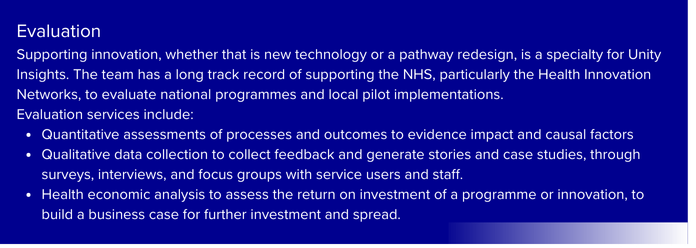
Ensuring patient safety

Maternity
The new government is prioritising improvements in women’s health, including maternity care. Many of the challenges in this space relate to the need for patient safety initiatives, quality improvement and the addressing of health inequalities.
We have provided advisory, assurance, quality improvement, evaluation, and quarterly reporting for the National Patient Safety Improvement Programmes (NatPatSIPs), including the Maternity and Neonatal safety improvement programme. Inequalities faced by different ethnicities in maternity is also a key priority signalled in the Labour manifesto. Another example is the evaluation conducted by Unity Insights on the Black Maternity Matters project.
Demonstrating impact
Conducting difference-in-difference analysis has helped disentangle outcomes of the national managing deterioration in care homes programme. We were able to estimate the effect of the programme on healthcare utilisation (factors such as 999 calls, emergency admissions and acute occupied bed days). This work enabled the programme to learn from its impact, to build best practice case studies and to present the case for future investment in this area.
Learn more about our work on quality improvement here.

Healthcare closer to home
The integrated care offer involving primary and community care is an area of continuing development. The new government has set clear commitments to improving access, reducing wait times, and improving continuity.

Access and continuity of care
Unity Insights have evaluated Foundry Healthcare Lewes Primary Care Network’s integrated model of care and generated a thought leadership report in response to the Fuller Stocktake. The model directly focused on access and continuity of care as the greatest priorities, and the evaluation was able to explore how successful and replicable the model was. The findings were used to demonstrate the value of the model to accelerate spread to additional PCNs, but also to support the model to further develop based on the learnings generated
Strategy
Wider system changes and integration requires careful strategic planning. We have used system dynamics modelling to understand system changes before implementation to optimise the design of new care models. Further, we have supported with prioritisation, measurement planning, and advisory services to a wide and diverse range of NHS and social care organisations undertaking substantive change.
Learn more about our work on access to primary care here.
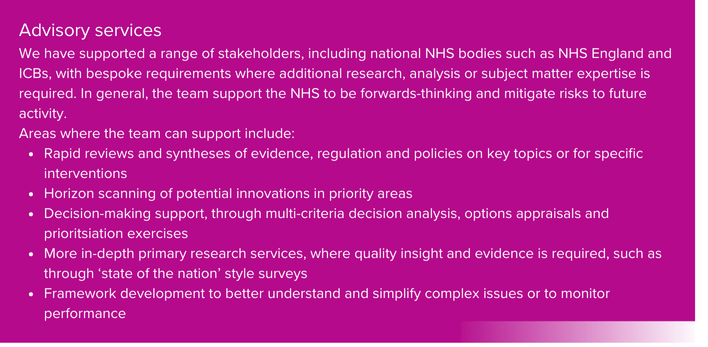
Social care reform
The government seeks to establish care standards across the nation to treat all individuals with care, dignity, and respect, whilst enabling individuals to live an independent life at home for as long as possible.

Technology-enabled care services (TECS)
The need to balance patient safety with the personal priorities of the individual receiving care forms a key priority. TECS have been found to help people live an independent lifestyle for longer. We have evaluated a TECS pilot delivered by NRS Healthcare through health economic and quantitative analysis. This helped understand both the financial impact of the pilot and the impact on the service user’s personal priorities.
Unity Insights evaluated the effectiveness of Procomp’s Strategic Optimisation Service in supporting the social care workforce. The report is to be used alongside supporting papers as an initial step to provide evidence of the potential impact of such solutions and the barriers in place, with long-term transformation of domiciliary care being the aim.

Effective communication
Providing the right tools to manage an individual’s care is a further challenge that needs to be addressed if social care is to be successfully transformed, digital supported tools can be used to provide more effective communication between teams and service providers, as well as with individuals receiving care, their families and carers. One key area of focus in our work has been in the evaluation of step-down processes from acute services into various care settings. For example, our evaluation of the ‘discharge to assess’ pathway in Kent, Surrey and Sussex, ensuring that long-term care needs following discharge are taken into account in the transition to a patient’s usual place of care. We have also provided evaluation services to assess the impact of specialised services, such as Yate and Frampton Primary Care Network’s frailty care pathway, utilising a range of approaches to enable anticipatory care for severely frail, housebound individuals.
Learn more about what we can offer for social care here.
Improving mental health
The government has proposed to increase the capacity of the workforce, reform legislation, and implement ‘Young Futures’ hubs to provide open access mental health services for children and young people.

Developing pathways that work for patients
Unity Insights delivered an evaluation that highlighted the need for greater access within Mental Health services at NHS Surrey Heartlands ICB. Despite the successful, beneficial launch of new services in recent years, referral criteria can leave vulnerable people in a position where they are unable to access the support they need until they deteriorate further. The provision of open access services, as well as enhancing support for primary care clinicians, and integrating public and third sector mental health services, was observed to make strong inroads into meeting unmet need in the area.
Supporting the workforce
It is essential to both expand and develop the mental health workforce, investing in the skills required to treat mental health concerns with confidence and sensitivity. For example, the aforementioned service transformation in Surrey Heartlands ICB focused greatly on the incorporation of people with lived experience, supporting primary care staff through training and consultation services. Unity Insights also worked in partnership with Health Innovation KSS to observe the use of the Additional Roles Reimbursement Scheme (ARRS) to employ more Mental Health Professionals (MHPs) within primary care settings. Similarly, we observed the impact of a mobile application, S12 Solutions, to provide remote access to MHPs, improving the delivery of mental health assessments, and releasing pressure on GP services.
Learn more about our work on mental health here.
Reducing health inequalities
Health inequalities have been a growing priority for many years within the NHS, and the new government continues this commitment.

Embedding inequalities into every project
Unity Insights quantitatively assesses access, quality, and outcomes of care to determine whether this is equal across demographic groups to understand health inequalities. Qualitative insights are can also be used to understand user lived experiences, generating case studies to amplify the voices of underserved communities. This analysis can be utilised as part of an evaluation to enhance the understanding of inequalities and demonstrate positive impact or identify areas for improvement.

Bespoke insights
Population data such as from local or public sources is analysed and overlayed onto healthcare data to understand patterns in inequalities that are bespoke to specific conditions or pathways. A binomial test uncovered that there was a statistically significant increase in the uptake of an online antenatal class in Black women, compared to the overall population. This evidenced that the antenatal class mitigated the impact of health inequalities for the overall population of Black women in the area.
Learn more about our work on health inequalities here.
Net zero

Both the new government and the NHS are committed to Net Zero targets, with the NHS aiming to achieve this target by 2045, meaning the environmental impact of new innovations and services must be considered as part of any transformation projects.
Assessing environmental impacts have formed an increasingly important element of our analyses in recent years, whether that be in the form of incorporating these benefits into a health economic modelling on the environmental impact of single-use vs reusable medical apparatus, or the potential environmental impacts of implementing an AI-enhanced digital contrast for CT scanning across England.
Learn more about our work on sustainability here.
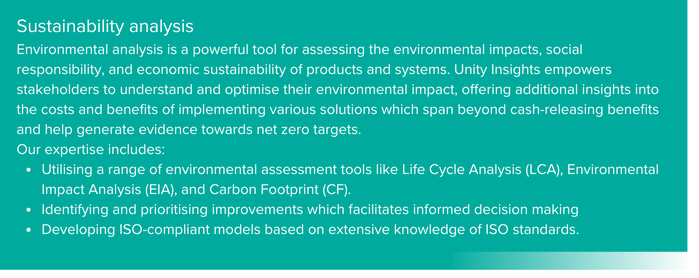
Discover more at our free workshops
Unity Insights are hosting a series of free workshops based on the priorities covered in the current document. These workshops aim to use real-world examples to deepen your understanding of how analytics can be used to facilitate progression of each of priority discussed. Participants will have the opportunity to engage with experts from the team and understand how we can help evidence the impact of innovations.
Workshops covered include:
